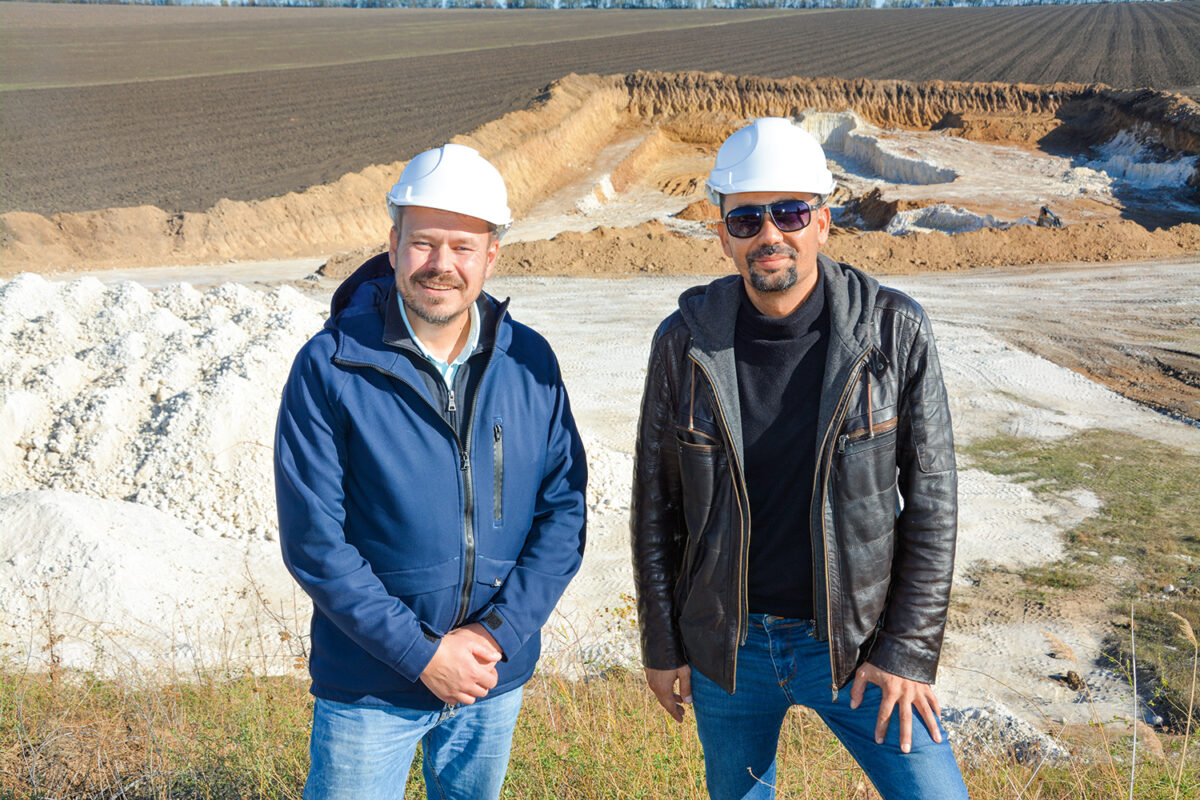In the rural heart of central Ukraine, one of the country’s most ambitious wartime investment initiatives is underway. At a quarry in Kirovograd Oblast’s Haivoron region, efforts began in March 2023 to excavate Ukraine’s highly sought-after kaolin clay for export to Türkiye and global markets. The project is the work of Turkish-based industrial minerals company Esan, and is believed to be the only international mining operation launched in the country since the onset of Russia’s full-scale invasion in February 2022.
Esan Ukraine Country Manager Cenk Gültekin says the decision to begin mining operations in Kirovograd Oblast was taken after assessing the new realities in wartime Ukraine. Esan has been present in Ukraine since 2004, but did not previously maintain its own quarries in the country. However, when the Russian invasion disrupted connections with the company’s existing kaolin clay suppliers close to Mariupol in eastern Ukraine’s Donbas region, it made sense to explore possible alternatives.
Esan Ukraine’s involvement with the Kirovograd Oblast site actually dates back to exploration work in the 2000s. This was followed by the long process of securing the necessary land rights. Gültekin, who has been based in Ukraine since 2018, says support from the Turkish Embassy, the American Chamber of Commerce in Ukraine, and the Ukrainian government’s UkraineInvest agency proved instrumental in resolving a range of regulatory issues with the local and national authorities. “Thanks to them, we have our quarry,” he comments.
Preliminary drilling work was completed in December 2021, just weeks before the start of Russia’s full-scale invasion. Unsurprisingly, the outbreak of hostilities temporarily derailed plans for the development of the site, but the idea was not shelved entirely. Gültekin says that by summer 2022, he and his colleagues began exploring the possibility of proceeding, once it became clear that exporting from wartime Ukraine could be both logistically and economically viable.
Moving large quantities of kaolin clay from Ukraine was to an extremely complex task. The naval blockade of Ukraine’s Black Sea ports imposed by Russia in the weeks before the full-scale invasion meant that the traditional maritime route for much of Ukraine’s commodity exports was closed in early 2022. During the early months of the war, Ukraine attempted to address the blockade by expanding the capacity of port facilities in Izmail on the Danube river close to the country’s border with Romania. This created new opportunities for exports via routes running along the western coastline of the Black Sea. “Once Ukrainians learned to cope with the logistical challenges created by the war, prices became more reasonable,” notes Gültekin.
An initial shipment sailed from Izmail to Istanbul in August 2023. With Ukraine’s humanitarian Black Sea corridor initiative gaining momentum during the final months of 2023, Esan Ukraine is now working with Odesa Oblast’s Chornomorsk port, which is significantly closer to the company’s quarry and offers far more competitive transport connections for trucks carrying cargo for export. With further shipments planned, more Ukrainian kaolin clay bound for the EU market in the first quarter of 2024. Potential European partners have also expressed in an interest in developing cooperation, raising the possibility of additional export destinations in the coming spring.
With just a few hectares of Esan Ukraine’s 136-hectare license currently under exploitation, there is huge scope to expand the scale of the company’s kaolin clay mining operations in central Ukraine. Looking ahead, Gültekin’s vision includes the construction of an enrichment facility at the site in order to produce value-added produce for the Ukrainian and neighboring EU markets. This could potentially quadruple revenues, he says.
Working in a country engaged in Europe’s largest armed conflict since World War II is obviously a daunting task, but Gültekin remains unfazed. He notes that his company’s quarry site is located a long way from the current front lines of the conflict, and cites the strong support he has received from his Turkish colleagues in Istanbul, who were ready to proceed with the investment as long as it would not compromise the safety of the Esan Ukraine team.
Nevertheless, there is no escaping the unpredictability of the current situation. Gültekin acknowledges today’s exceptional circumstances but argues that the benefits of doing business in Ukraine continue to outweigh the potential pitfalls. “There is no such thing as profit without risk,” he says. “If you want maximum opportunities, you must be prepared to accept a degree of risk. This is not always an easy country to work in, but with the right preparations and effective lobbying, any international investment can be successful.”
